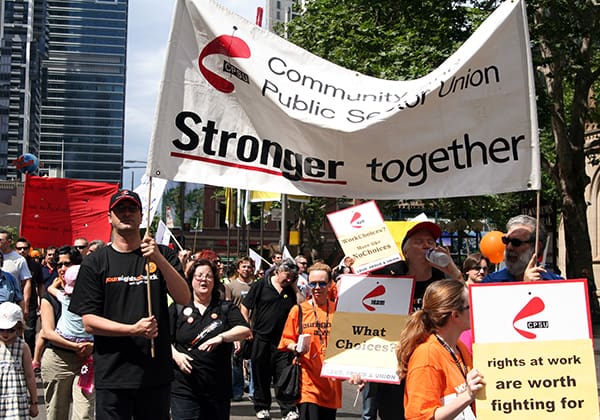University of Sydney professional staff have entered the most important round of enterprise bargaining they’ve seen in years.
The Community and Public Sector Union (CPSU) is taking a concise list of claims to its negotiations with the University, covering redundancy, job security, workplace change and professional staff workloads.
Job security and the rationalisation of change processes are high on the agenda. The CPSU is demanding genuine consultation with staff, the mitigation of excessive workloads, and that redundancies not increase pressure on remaining workers.
Professional staff at the University encompass all non-academic roles, from administration workers, to librarians, to the technical staff who set up science experiments.
The last twelve months have seen professional staff affected by countless redundancies and increased job insecurity, leading to higher workloads and increasing job dissatisfaction. In December 2020, the University announced it would accept 115 voluntary redundancies from professional staff members. This included 22 librarians and 22 staff members from student support services. These redundancies have drastically increased workloads for remaining staff.
“There has been tremendous change at the University and staff morale is very, very low,” said Grant Wheeler, Branch President of the NSW CPSU. “You cannot underestimate the psychologically unsettling effects that this has on staff. Many, many staff feel completely frayed at the moment – it is just a terrible situation to be in – but the University is driving on and I can see no end to these changes.”
“We’re the staff that keep the University running,” said Wheeler. “If we didn’t have professional staff there would be no University.”
Nevertheless, professional staff are undervalued by University management. Under the current enterprise agreement, their redundancy payouts are substantially lower than those of their academic counterparts. Severance payments for professional staff are capped at 62 weeks’ salary, whilst academics payouts are capped at 82. Consequently, the CPSU is bargaining for greater equity in redundancy packages.
“If we’re made redundant, if we don’t have a job offer, the consequences with regard to that are no less anxiety inducing, no less problematic. There’s no less of an effect on our family than on academic staff, yet we’re given less compensation,” said Wheeler. “We’re just claiming the respect of having the same weeks’ payout, in terms of the salary that you receive, when you exit the university against your will.”
The CPSU is also demanding improvements to leave provisions, including a doubling of the current pandemic leave entitlements (from 10 to 20 days), as well as flexible and remote working options. The union also proposes increased mental health support, improved bullying and harassment provisions and the establishment of a comprehensive sexual harassment clause.
Professional staff have raised concerns about several of the University’s proposals in their log of claims. The CPSU noted the University’s suggestion to shorten the enterprise agreement could reduce its enforceability. Anything not enshrined in the enterprise agreement would be implemented in policy which is more frequently ignored by University management.
Other elements of the University’s proposal similarly threaten to complicate union ability to dispute claims. This includes a streamlined disputes clause and the application of status quo provisions during internal disputes.
The University’s proposal to remove the requirement to advertise for professional staff positions internally before seeking employees externally threatens to stunt career progress for professional staff. Professional staff are unable to apply for promotions like academic staff, therefore much of their career trajectory is based on internal job applications.
Cuts to staff training and the suggestion that the University may cost any conditional gains set off alarm bells for the CPSU.
“There’s a classic phrase being used and overused, and that is never waste a crisis,” said Wheeler. “I think the University is going to have that front and centre when it sits down and starts discussing not only enhancements to our working conditions, but when it talks about what it sees as necessary erosions to the current conditions.”
Enterprise bargaining negotiations began last week and are scheduled throughout August and September.





